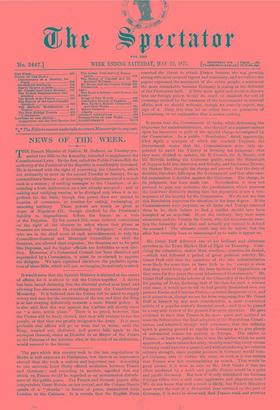It seems that the Government of India, while dethroning the
Guicowar for maladministration, also decided as a separate matter upon his innocence or guilt of the special charge investigated by the Commission. In a public "Resolution," dated, apparently, 23rd April, a synopsis of which has reached England, the Government states that the Commissioners were only ap- pointed to assist the Viceroy in forming his judgment ; that they were divided in opinion, Sir R. Crouch, Sir R. Meade, and Mr. Melville holding the Guicowar guilty, while the Maharajah of Jeypore held him innocent, and Scindia, and his former Dewan, Sir Dinkur Rao, thought the charge not proved; that the duty of decision, therefore, falls upon the Government, and that after care- ful examination it decides against the Guicowar. The charge, in its judgment, has been made out. Nevertheless, it does not proceed to pass any sentence, the proclamation which removes the Guicowar distinctly stating that the deposition is not a con- sequence of the inquiry by the Commission. We do not see that this Resolution improves the situation in the least degree. If the Commissioners were jurymen, as all India and Europe assumed them to be, their failure to find a verdict should have been accepted as an acquittal. If, on the contrary, they were mere examiners, and the Viceroy the Court, why did Government sanc- tion the formality of a trial, and actually pay counsel to defend the accused? The ultimate result may not be unjust, but the affair has certainly been so mismanaged as to make it appear so.


































